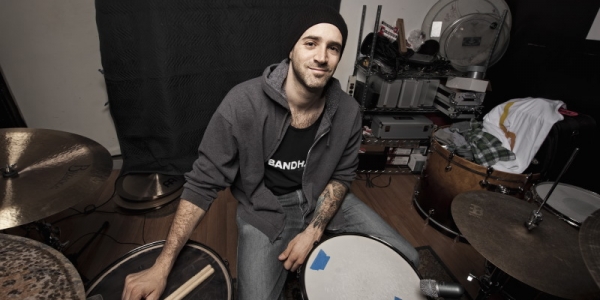Mancunian three-piece electronic rock band Delphic are more than aware of this difficulty; their 2010 debut LP Acolyte was released to positive reviews, garnering a plethora of admirers who were drawn in by the gleefully euphoric mash-up of guitar pop and ‘90s rave-inspired sonic melodies. The two singles it yielded, Doubt and Halcyon, were gems of inspired beats and rhythms. Following the album’s release, Delphic embarked on a two-year long world tour.
Fusing elements of dream-pop, electronica, trance and hip hop into its folds, Delphic’s second album Collections was released earlier this month, nearly three years to the day after the release of their debut. According to founding member and vocalist Rick Boardman, it was a very trying and complicated trip.
“One of the reasons [Collections] took such a long time – it’s kind of interesting – we were writing it on the road, and we were writing it before Acolyte was released, trying to keep up on the writing and thinking of the follow-up and what the follow-up would be,” he explains, rather amiably, over the phone from his home in Manchester. “And I think we felt slightly restricted, within our style. We had a very definite sound with Acolyte, being as it was influenced by the ‘90s kind of euphoric rave music that we thought was a quite interesting juxtaposition of sounds … but we just exhausted it. There was just nowhere to go with it!”
By “it”, Broadman is referring to the Delphic sound itself. This presented something of a quandary, as he and his band-mates Matt Cocksedge and James Cook didn’t want to release just another rehash of their debut.
“So I think the reason it took a while was because we were trying to force out ideas in a similar vein – we had to regroup and rethink and define something new and do something that would enable us in the future to render anything we want!”
So what was it that helped bring Collections together? What was the album’s linchpin? What was the band’s “a-ha” moment?
It wasn’t a particular thing, he thoughtfully explains to me after a short pause. “It was the idea of us not being limited. By discovering that we could do anything we want if it sounds good.” He draws a breath and continues, “I think being in a band and creating things – so much of it is psychological. The three of us went through so much … meditation and therapy and everything, because we were really confused!”
Luckily, the long dark night of their souls lifted with a pretty fascinating epiphany – just do what feels right.
“Things just clicked into place at some point,” he reveals happily. “That sounds nothing like Delphic, but it sounds good!’ It was a moment of ‘let’s just be ourselves’ and ‘let’s stop worrying about what someone expects of us or what the logical progression would be in the record label’s head or the manager’s head’ – it’s like, ‘do I like this right here and now? Yes, I do’.”
BY THOMAS BAILEY

